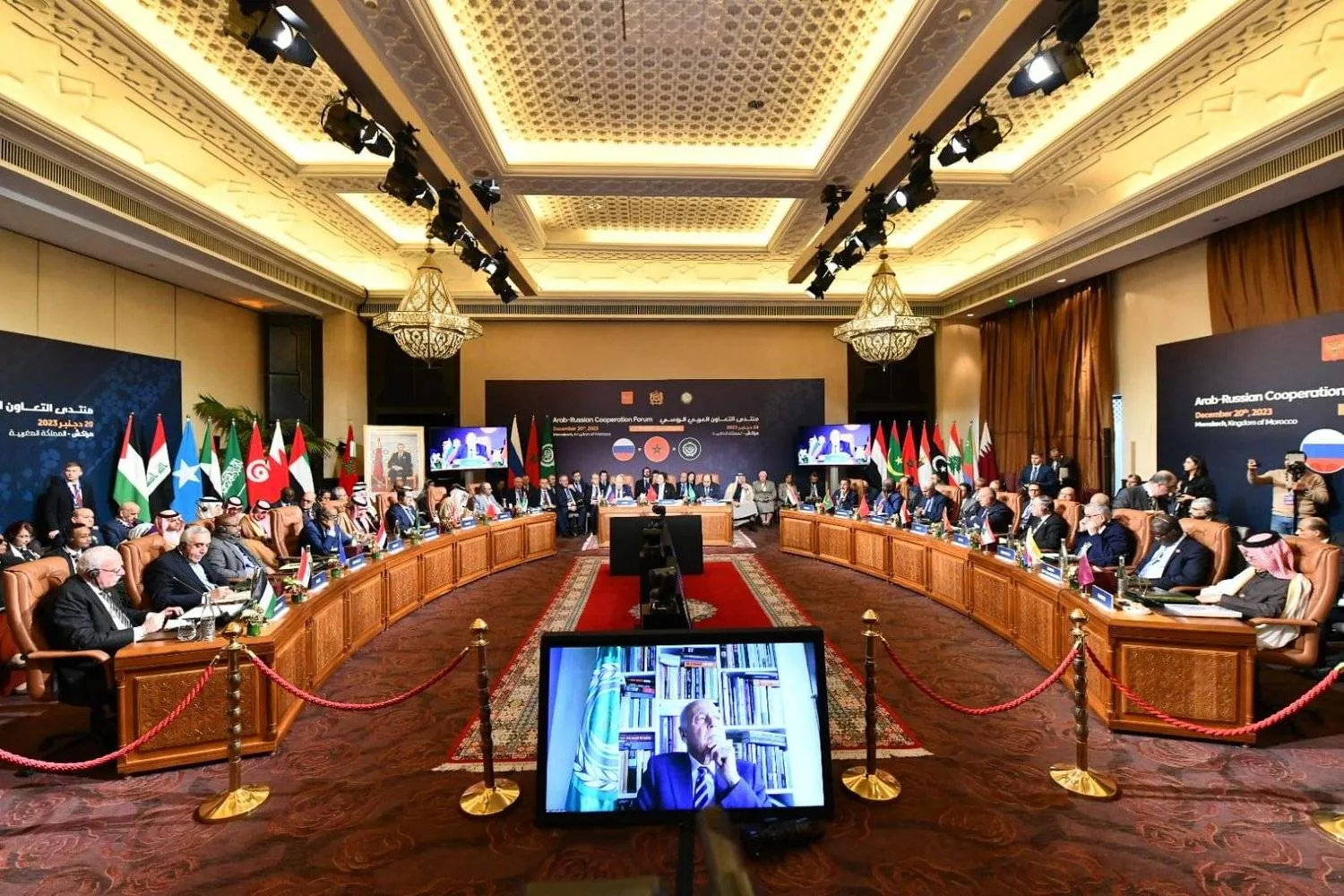Russian Foreign Minister Sergei Lavrov said that the threats in the Middle East necessitate a "common" position to solve dangers that pose challenges for the region.
Lavrov was speaking at the opening of the 6th session of the Arab Russian Forum, which kicked off in Marrakech.
"This meeting is held in a context marked by an unprecedented escalation of the situation in the Middle East and lingering turmoil in the world, "Lavrov said at the opening ceremony of the Forum, chaired by Morocco's Minister of Foreign Affairs, African Cooperation and Moroccan Expatriates, Nasser Bourita.
Lavrov addressed the Israeli-Palestinian conflict, describing the situation as "unprecedented," stressing that Russia's current priorities are to stop the bloodshed and provide the necessary conditions for humanitarian assistance.
Lavrov emphasized that the current situation will persist and recur until the root causes of the conflict are addressed.
Russia also regrets the "long-standing lack of justice and the failure to achieve the aspirations of the Palestinian people to establish their state with its capital in East Jerusalem on the 1967 borders."
The Russian top diplomat stated that Moscow's position is similar to the stances expressed by Arab countries during the Arab Islamic Summit held in Riyadh last year.
"Our joint task is to support the conflicting parties in initiating a negotiation process and resolving all disputes within it, and we need a common diplomatic mechanism to implement the international community's decisions.
For his part, Bourita highlighted the tangible progress in Russian-Arab cooperation since establishing the partnership in 2009.
He emphasized the maturity of the Forum, underlining its significance as a framework for dialogue and collaboration aligned with mutual expectations.
The Moroccan FM aspired to elevate the Forum to a level of genuine and effective Arab-Russian strategic dialogue, emphasizing "respect, shared responsibility, openness, solidarity, and commitment" as the pillars of this partnership.
He called for a balanced approach that considers both partners' political and economic interests alongside the realities, capabilities, and aspirations.
Morocco reiterated its concerns about the situation in Gaza, and Bourita stressed the need for an immediate de-escalation in Gaza amid Israeli aggression.
The FM reiterated King Mohammed VI's call for collective action to de-escalate the situation and achieve a permanent and monitorable ceasefire to protect civilians.
He said this aims to facilitate the flow of humanitarian aid to Gaza and establish a political horizon for the Palestinian issue based on the internationally agreed upon two-state solution.
Bourita added that King Mohammed VI repeatedly stressed that no alternative to peace in the region guarantees the Palestinians their legitimate rights within the framework of the two-state solution and an independent Palestinian state with East Jerusalem as its capital.
Addressing the Libyan crisis, Bourita expressed hope for the completion of the political process in the country through inter-Libyan efforts free from external influences and intervention.
According to Boruita, this would mark the beginning of a new phase in Libya, characterized by stability, legitimacy, and response to the Libyan people's aspirations.
Also at the Forum, Arab League Sec-Gen Ahmed Aboul Gheit said in his speech that Arab-Russian ties have proven their effectiveness throughout history through close cooperation and mutual trust.
Aboul-Gheit explained that the Arab region witnessed security and political challenges in recent years, highlighting that overcoming these complex crises in Syria, Yemen, Sudan, and Somalia requires understanding and cooperating among major international powers, including Russia, as a genuine partner of many Arab countries.
The Palestinian cause remains a primary concern facing the region, said the diplomat, recalling that the Israeli crimes in Gaza are a disgrace to everyone who supported them or stood against an immediate ceasefire in the Strip.
Aboul Gheit also stressed that addressing the Gaza tragedy and preventing its recurrence requires a radical solution, noting that "this means implementing the two-state solution as quickly as possible."
The final statement of the Forum said that its participants stressed the principle of freedom of maritime navigation in international waters by international laws and sea agreements.
The communique stressed the need to guarantee the safety and security of maritime traffic in the Gulf and the Red Sea.
It also called for securing energy supply lines, rejecting actions targeting the security and safety of navigation and maritime facilities, energy supplies, oil pipelines, and oil installations in the Arabian Gulf and other waterwa









